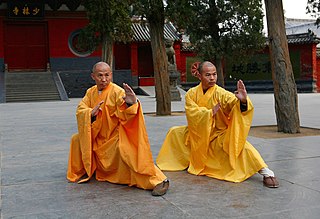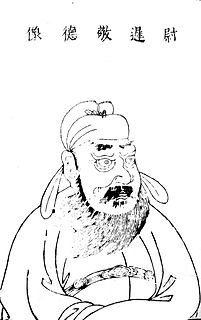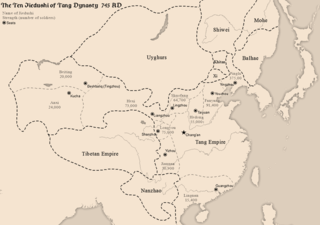Plot
Decades have passed since the battle on Mount Feihu in Datang Youxia Zhuan , in which Wang Yanyu killed Dou Lingkan and his four brothers, and put an end to the Dou family's reign as the leaders of the wulin (martial artists' community). Unknown to everyone, Dou Yuan, an orphan of the Dou clan, has survived and spent the past 30 years training in martial arts to avenge his clan. Dou Yuan kills Wang Yanyu and her husband, Zhan Yuanxiu. Before dying, Wang Yanyu tells her son, Zhan Bocheng, to join Chu Sui (a former follower of her father, Wang Botong), and forbids him from seeking revenge and informing Tie Mole (the current leader of the wulin) about their deaths. As Dou Lingkan was Tie Mole's godfather, the situation will become more complicated if Tie Mole gets involved.
Datang Youxia Zhuan is a wuxia novel by Liang Yusheng. It was first serialised between 1 January 1963 and 14 June 1964 in the Hong Kong newspaper Ta Kung Pao. The novel is the first part of a trilogy, and is followed by Longfeng Baochai Yuan and Huijian Xinmo.
Chu Sui favours Zhan Bocheng and plans to arrange a marriage between his granddaughter, Chu Baoling, and Zhan. However, Chu Baoling is already in love with Liu Mang, a young youxia . Liu Mang and his father are plotting to take a hoard of treasure left behind by Wang Botong to finance their outlaw activities, but Chu Sui sees them as robbers. This results in a fight between both sides. Dou Yuan takes advantage of the conflict to attempt to seize the treasure. Chu Sui dies after sustaining serious injuries during the fight. Zhan Bocheng survives with the help of Tie Mole's children (Tie Zheng and Tie Ning) while Dou Yuan retreats. Tie Mole gains control of the treasure and uses it to finance the outlaws' activities. Meanwhile, Dou Yuan becomes more ambitious and plots to dominate the wulin by allying himself with lowlifes, corrupt government officials and foreign tribes. With backing from Uyghur nobles and Tian Chengsi, Dou Yuan moves to stir up conflict in the wulin.
Youxia was a type of ancient Chinese warrior folk hero celebrated in classical Chinese poetry and fictional literature. It literally means "wandering vigilante", but is commonly translated as "knight-errant" or less commonly as "cavalier", "adventurer", "soldier of fortune" or "underworld stalwart".
Tian Chengsi, formally the Prince of Yanmen, was a general of the Chinese rebel state Yan, who later submitted to and became a general of Tang Dynasty, from which Yan had rebelled. As was in the case of several other Yan generals who submitted to Tang but who had substantial army and territorial holdings, Tian was allowed to retain his command and territory, semi-independent of the Tang imperial government structure, and among these generals, he was particularly defiant of the Tang imperial government.
Zhan Bocheng, Tie Zheng and Tie Ning encounter trouble while escorting the treasure but are saved by Hua Zongdai and his daughter. At the same time, Nan Jiyun's children also join the fight against the villains. Dou Yuan makes bigger plans to control the Yangtze River and dominate the wulin. Under the leadership of Kongkong'er, the young heroes battle against Dou Yuan and his allies and eventually defeat them. Around the time, they also receive news that Chu Pingyuan and Yuwen Hongni of Shituo Kingdom are under attack by the Uyghurs, so they travel to Shituo and assist them in driving away the invaders. The Uyghurs enlist the help of Sikong Tu and his men to fight the heroes, and a battle breaks out. Dou Yuan is eventually defeated and crippled by Zhan Bocheng and Chu Baoling, thereby preventing him from using his skills to do evil again; Sikong Tu is slain by Tie Mole.

Romance of the Three Kingdoms is a Chinese television series adapted from the classical novel of the same title by Luo Guanzhong. The series was produced by China Central Television (CCTV) and was first aired on the network in 1994. It spanned a total of 84 episodes, each approximately 45 minutes long. One of the most expensive television series produced at the time, the project was completed over four years and involved over 400,000 cast and crew members, including divisions of the People's Liberation Army from the Beijing, Nanjing and Chengdu military regions. Some of the dialogues spoken by characters were adapted directly from the novel. Extensive battle scenes, such as the battles of Guandu, Red Cliffs and Xiaoting, were also live-acted.

Three Kingdoms is a 2010 Chinese television series based on the events in the late Eastern Han dynasty and the Three Kingdoms period. The plot is adapted from the 14th century historical novel Romance of the Three Kingdoms and other stories about the Three Kingdoms period. Directed by Gao Xixi, the series had a budget of over 160 million RMB and took five years of pre-production work. Shooting of the series commenced in October 2008, and it was released in China in May 2010.

Paladins in Troubled Times is a 2008 Chinese television series adapted from Liang Yusheng's novel Datang Youxia Zhuan. The series was produced by Zhang Jizhong, and starred Victor Huang, Shen Xiaohai, TAE, He Zhuoyan, Liu Tianyue and Lu Chen. It was first broadcast on CCTV in 2008.

Fox Volant of the Snowy Mountain is a 2006 Hong Kong-Chinese television series adapted from Louis Cha's novels Fox Volant of the Snowy Mountain and The Young Flying Fox. Directed by Andrew Lau and Tam Yau-yip, the series is a co-production by the Hong Kong companies ATV and Ciwen Pictures, with Wong Jing as producer, starring Nie Yuan, Athena Chu, Gillian Chung, Ady An, Alex Fong, Anthony Wong and Patrick Tam. It was first broadcast in Hong Kong on ATV in 2006.
Xiagu Danxin is a wuxia novel by Liang Yusheng. It was first serialised between 5 October 1967 and 20 June 1969 in the Hong Kong newspaper Sin Wan Pao (新晚報). It is a sequel to Yunhai Yugong Yuan and is closely related to two of Liang Yusheng's other novels, Binghe Xijian Lu and Fenglei Zhen Jiuzhou.
Longfeng Baochai Yuan is a wuxia novel by Liang Yusheng. It was first serialised between 25 June 1964 and 15 May 1966 in the Hong Kong newspaper Ta Kung Pao. The novel is the second part of a trilogy, and is preceded by Datang Youxia Zhuan and followed by Huijian Xinmo.

King's War, also known as Legend of Chu and Han, is a Chinese television series based on the events in the Chu–Han Contention, an interregnum between the fall of the Qin dynasty and the founding of the Han dynasty. It started airing on Anhui TV, Zhejiang TV, Jiangxi TV and Tianjin TV on 28 December 2012.

The Heaven Sword and Dragon Saber is a Taiwanese television series adapted from Louis Cha's novel of the same title. The series was first broadcast on TTV in Taiwan in October 1984.

The Han Triumph, also known as Wind Ode, is a Chinese television series based on historical events in the early Han dynasty, beginning with the founding of the dynasty by Liu Bang after his triumph over Xiang Yu, and the events leading to the reign of Liu Heng. Directed by Huang Jianzhong, the series starred Ray Lui, Wang Ji, Liu Mu, Zhang Guangbei, Chen Wei and Li Qingxiang in the leading roles. It was first broadcast on CCTV-8 in China on 17 December 2011.

Justice Bao is a Chinese TV series starring producer Jin Chao-chun as the Song dynasty official Bao Zheng. The series ran for 3 seasons from 2010 to 2012. In addition to Jin, Kenny Ho, Fan Hung-hsuan and Lung Lung again reprise their iconic roles from the 1993 Taiwanese hit Justice Pao and the 2008 Chinese series Justice Bao.

Wu Zi Bei Ge, also known as Wu Zi Bei Ge: Wu Zetian Zhuan, is a 2006 Chinese television series based on the life of Wu Zetian, the only woman in Chinese history to assume the title of "Empress Regnant". The series was directed and written by Chen Yanmin, and starred Siqin Gaowa and Wen Zhengrong as the empress. The series' title Wu Zi Bei Ge literally means "Song of the Uncharactered Stele", with the "stele" referring to the unmarked one standing near Wu Zetian's tomb at the Qianling Mausoleum.
The Dark Tales is a series of Hong Kong television period supernatural dramas that originally aired on Jade from 18 March 1996 to 1 May 1998, consisting of two installments with 75 episodes. Based on Qing Dynasty writer Pu Songling's series of supernatural tales called Strange Stories from a Chinese Studio, Dark Tales is produced by TVB and stars a cast of mainly Hong Kong and Taiwanese actors.
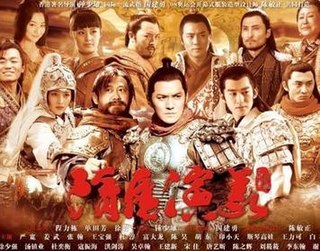
Heroes in Sui and Tang Dynasties is a Chinese television series based on Chu Renhuo's historical novel Sui Tang Yanyi, which romanticises the historical events leading to the fall of the Sui dynasty and the rise of the Tang dynasty. The series was first broadcast in mainland China on various television networks on 14 January 2013. It is not to be confused with Heroes of Sui and Tang Dynasties 1 & 2, a similar television series also based on the novel, but was released earlier in December 2012. Filming for the series started on 5 November 2011 at the Hengdian World Studios and wrapped up in May 2012.

The Romance of the Condor Heroes is a 2014–15 Chinese television series produced by Yu Zheng and adapted from Jin Yong's novel The Return of the Condor Heroes, with additional material from the preceding novel, The Legend of the Condor Heroes. It stars Chen Xiao and Michelle Chen in the lead roles. The series was first broadcast on Hunan TV from 3 December 2014 to 11 March 2015.

God of War, Zhao Yun, released under the title Dynasty Warriors in Indonesia, is a 2016 Chinese television series directed by Cheng Lidong and produced by Zhejiang Yongle Entertainment Co., Ltd. The series starred cast members from mainland China, South Korea and Taiwan: Lin Gengxin, Im Yoon-ah, Kim Jeong-hoon, Jia Qing, Godfrey Gao, Guo Dongdong, Meng Ziyi, Nazha, Yan Yikuan, Zhao-Han Yingzi, Fan Yulin, Collin Chou and Sun Xiaoxiao. The story is loosely adapted from the 14th-century Chinese classical novel Romance of the Three Kingdoms, with Zhao Yun as the main character. It was first aired on Hunan TV from 3 April to 7 May 2016.
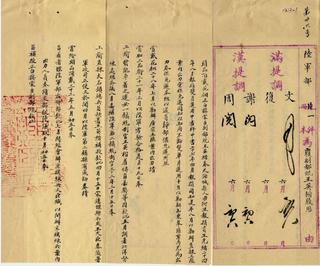
Wang Yingkai, whose courtesy name was Shaochen (紹宸), was a Chinese general in the Beiyang Army and first rank official of the late Qing dynasty, who served as the Vice President of the Ministry of War and Vice-Commander-in-Chief of the Plain White Banner. Wang graduated from the Tianjin Military Academy (天津武備學堂), also known as Beiyang Wubei Xuetang (北洋武備學堂), and fought with distinction in the First Sino-Japanese War. After China lost the war, he joined the Beiyang Army established by Yuan Shikai and became one of leading commanders of the army. However, during subsequent political struggles he sided with the court party against Yuan. Sun Chuanfang, who later became one of the most important warlords in the early Republican years, was his brother-in-law and protégée. Wang Yingkai died in Beijing in 1908.
